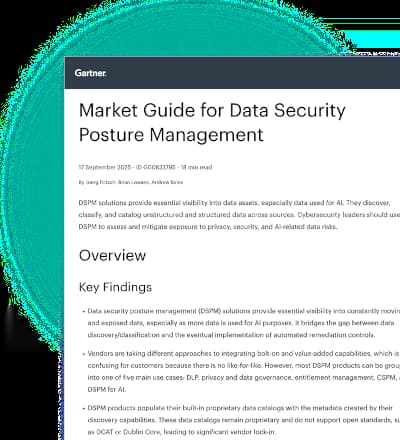Comparing the Top Data Access Governance Vendors
0 دقائق القراءة

Lionel Menchaca
Data moves faster than ever across cloud apps, endpoints and collaboration platforms, making it harder to control who has access and how that access is used.
Effective data access governance (DAG) provides the visibility, context and automation needed to protect sensitive information without slowing productivity. This comparison of top data access governance vendors shows how leading products differ in discovery, analytics and remediation capabilities to help organizations reduce exposure and maintain compliance.
If you’re evaluating solutions, this comparison builds on insights about data access governance tools to help you choose the right partner for your data security journey.
How to Evaluate Data Access Governance Vendors
When comparing data access governance software, buyers should look beyond feature lists to evaluate how vendors help identify, control and protect sensitive data at scale. Key evaluation criteria include:
- Discovery and Classification: How comprehensively the solution identifies sensitive structured and unstructured data across cloud and on-prem sources.
- Access Analytics: Whether the platform provides clear insight into who has access to what data—and why.
- Automation and Remediation: The ability to automatically fix overexposed data or excessive permissions without manual workflows.
- Integration and Scalability: Cloud-native architecture and deep integrations with DSPM, DLP, CASB, and identity systems.
- AI and ML Capabilities: Use of AI for automated classification, anomaly detection, and contextual risk scoring.
Data Access Governance Vendor Comparison Table
Vendor | Discovery & Classification | Access Analytics | Automation & Remediation | Cloud Coverage | Integration Breadth | AI & ML Capabilities | |
| Forcepoint | ✅ Structured + unstructured data, DLP-readable tags | ✅ Full visibility via AD and IRM | ✅ Built-in remediation, workflows, ROT cleanup | ✅ Cloud-native SaaS + on-prem | ✅ DSPM + DDR + DLP + CASB integration | ✅ AI/ML classification, custom models | |
| Varonis | ✅ Strong unstructured coverage | ✅ Permissions analytics | ⚠️ Manual policy recreation, limited automation | ⚠️ Cloud Native - *Requires[CT1] reconfiguration when moving to SaaS from on-prem | ⚠️ Limited SaaS integration | ⚠️ Basic ML | |
| Cyera | ✅ Structured + unstructured | ✅ Risk scoring | ⚠️ Relies on third-party integration for most remediation | ✅ Cloud-native | ⚠️ Limited on-prem connectors | ✅ ML-based discovery | |
| BigID | ✅ Privacy-first data discovery | ⚠️ Limited access analytics | ⚠️ Requires workflow tools for remediation | ✅ Multi-cloud | ✅ Privacy and compliance connectors | ✅ AI-based classification | |
| Rubrik | ⚠️ Backup-centric visibility | ⚠️ Minimal access analytics | ⚠️ Limited governance workflows | ✅ Multi-cloud | ⚠️ API-level integration | ⚠️ None | |
| Microsoft Purview | ✅ Strong Microsoft 365 coverage | ✅ Permission visibility in native apps | ⚠️ Manual remediation | ✅ Deep Microsoft ecosystem | ⚠️ Limited third-party support | ⚠️ Basic ML | |
Based on Forcepoint DSPM Feature Comparison (October 2025)
Vendor Snapshots
Forcepoint
Overview
Forcepoint delivers a unified approach to data access governance through its integrated Forcepoint Data Security Cloud, combining Forcepoint DSPM, DDR, DLP and CASB.
Key Capabilities
- AI and ML classification via AI Mesh for structured and unstructured data
- Built-in remediation and workflow automation
- DLP-readable labels for consistent policy enforcement
- Real-time visibility into permissions and data exposure
Strengths
- Fully unified platform covering discovery, classification, analytics and enforcement. Integrated Risk-Adaptive Protection (RAP) enables dynamic, behavior-based policy control. Learn more about what sets Forcepoint DSPM apart from the competition.
Limitations
- Forcepoint’s unified architecture prioritizes breadth of protection over single-function simplicity, which can be more than smaller teams need if they’re focused solely on DSPM features.
Ideal for enterprises seeking a cloud-native or on-prem, end-to-end solution for continuous data risk governance.
Varonis
Overview
Varonis has long been recognized for strong file-system visibility and permissions analytics across on-prem and hybrid environments. The company is now transitioning customers to its SaaS platform, which consolidates file, cloud, and collaboration data under a single interface.
Key Capabilities
- Deep analysis of file permissions, data activity and insider risk
- Compliance-ready classification and reporting across on-prem and cloud repositories
- Expanded SaaS coverage for Microsoft 365, SharePoint, and other cloud storage
Strengths
- Varonis continues to offer powerful insights into unstructured data and access activity. Customers praise its depth of visibility and strong analytics once the SaaS environment is fully tuned.
Limitations
- Migration from on-prem to SaaS is not automated. Customers must re-add data sources, rebuild alerting policies and reconfigure workflows manually, since there is no one-click migration tool. This transition requires time to reestablish baselines and fine-tune alerts in the new environment.
Ideal for enterprises that prioritize detailed file and permissions analytics and are prepared to manage SaaS deployment as a new implementation rather than an in-place upgrade.
Cyera
Overview
Cyera is a cloud-native data security vendor specializing in DSPM and data exposure analysis.
Key Capabilities
- AI-driven discovery across structured and unstructured data
- Risk scoring to prioritize exposure
Strengths
- Fast cloud deployment and modern architecture for multi-cloud environments.
Limitations
- Relies on integrations for remediation; limited coverage for on-premises systems.
Ideal for organizations prioritizing cloud-native discovery with flexible risk scoring.
BigID
Overview
BigID began as a data privacy platform and has evolved to include governance and classification features.
Key Capabilities
- Privacy-centric discovery and compliance reporting
- Customizable AI classification models
Strengths
- Strong privacy and compliance integrations; flexible APIs.
Limitations
- Limited access analytics and direct remediation features.
Ideal for privacy-driven organizations needing data mapping across multiple compliance frameworks.
Rubrik
Overview
Rubrik approaches data governance from a backup and recovery perspective, extending visibility into stored data.
Key Capabilities
- Backup-integrated data discovery
- Basic exposure analysis
Strengths
- Effective for organizations prioritizing ransomware resilience and recovery.
Limitations
- Limited governance workflows and minimal access analytics.
Ideal for IT teams looking to extend existing backup systems into basic data governance.
Microsoft Purview
Overview
Microsoft Purview integrates classification, labeling, and compliance across Microsoft 365 and Azure environments.
Key Capabilities
- Native discovery and labeling for M365 data
- Permissions visibility via Microsoft Defender and Entra ID
Strengths
- Ideal for Microsoft-centric enterprises seeking native compliance alignment.
Limitations
- Manual remediation and limited third-party integration.
Ideal for organizations invested in the Microsoft ecosystem seeking native governance capabilities.
Why Forcepoint Leads in Data Access Governance
Forcepoint’s integrated security solution unifies data discovery, access analytics and automated control into a single platform. With advanced AI Mesh classification, the platform extends visibility across structured and unstructured data, while built-in automation remediates excessive permissions and redundant data in real time.
Unlike point solutions, Forcepoint provides continuous governance across DSPM, DDR, DLP and CASB, ensuring protection from discovery to enforcement.
See your data risk clearly. Request a free Data Risk Assessment.

Lionel Menchaca
اقرأ المزيد من المقالات بواسطة Lionel MenchacaAs the Content Marketing and Technical Writing Specialist, Lionel leads Forcepoint's blogging efforts. He's responsible for the company's global editorial strategy and is part of a core team responsible for content strategy and execution on behalf of the company.
Before Forcepoint, Lionel founded and ran Dell's blogging and social media efforts for seven years. He has a degree from the University of Texas at Austin in Archaeological Studies.
 How to Strengthen Data Access Governance with Forcepoint DSPMمشاهدة الفيديو
How to Strengthen Data Access Governance with Forcepoint DSPMمشاهدة الفيديو
X-Labs
احصل على الرؤى والتحليل والأخبار مباشرةً في الصندوق الوارد










